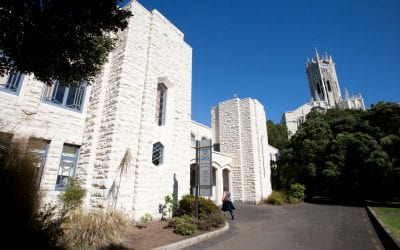Creative Computing (Online)
Are you eager to integrate technology into your creative process? Apply NowTalk to an AdvisorCreative Computing (Online)
Are you eager to integrate technology into your creative process? Apply NowTalk to an AdvisorRecommended Background
No specific experience required.
University Entrance (or equivalent) required for admission.
Duration
6 Weeks
Next Start Dates
-
6 January 2025 (Summer School)
Applications close Monday 16 December. Apply early to secure your spot.
Domestic Fees
$1,036.05 (estimate)*
Disclaimer: *Our Programme Advisors will provide all official programme information, including regulations about entry, enrolment, course fees, examinations and requirements for degrees, diplomas and certificates as per the University Calendar. Courses are paid per Term Session. Fees are set in advance of each calendar year and will be updated on this website. Fees are inclusive of 15% GST, but do not include the Student Services Fee, course books, travel and health insurance, or living costs. Amounts shown are indicative only. In addition to the tuition fee, there is a Student Services Fee of $9.24 per point. Fees will be confirmed upon completion of enrolment into courses.
Why is this course right for you?
Dive into Creative Computing, an innovative online course offered by the University of Auckland’s Elam School of Fine Arts. This 15-point course is designed for artists, designers, and creatives of all backgrounds, introducing you to the expanding field of creative computing – no previous coding experience required!
Course Summary
– Learn Coding Fundamentals
Engage with essential programming concepts tailored for artistic expression. Our supportive environment ensures that even complete beginners will feel confident and empowered as they gain valuable coding skills.
– Explore Generative and Algorithmic Art
Uncover how computation can serve as a transformative tool, material, and medium in your artistic practice. You’ll work on projects at the intersection of creativity and computational technologies, enabling you to produce innovative works of art.
– Participate in Engaging Workshops and Lectures
Experience a blend of self-paced learning and interactive live sessions designed to foster both individual exploration and collaborative projects. Benefit from constructive feedback through online forums and peer-to-peer interactions.
– Develop Critical Skills
Cultivate essential skills in problem-solving, critical thinking, communication, and collaboration – key competencies for a successful career in the arts and beyond. This course will equip you with the skills to engage creatively and critically with digital technologies shaping our contemporary world.
Programme Structure
The GradDipAppPsych is for those who want to develop foundational skills and knowledge in applied psychology. During this programme, you will learn about a variety of topics in applied psychology and how each relates to, and benefits from, relevant core areas of psychological knowledge, including brain and behaviour, sensory and cognitive psychology, lifespan development, learning and communication, social and cultural psychology, models of health and disability, as well as organisational and educational psychology, with an emphasis on the New Zealand context.
The GradDipAppPsych consists of 4 courses that total 120 points. Each course runs for 12 weeks, allowing you to study one course at a time and complete the programme in under 1.5 years (4 Term Sessions).
PSYCH 211 - Psychology for Society - 30 Points
Examines what we do and can know in psychology, and why and how we know it, including ethics, research outcomes, and particular methods. Embeds a focus on the cultural context of Aotearoa/New Zealand within which psychological knowledge is applied. Introduces broad content in preparation for more advanced study.
PSYCH 323 - Changes Across the Lifespan - 30 Points
Development is a lifelong process. Classic and modern theories of development provide a foundation for understanding changes and continuities across the lifespan. Students will learn how we develop key social, emotional, and cognitive abilities across infancy, childhood, adolescence, and adulthood. Developmental psychology will then be applied to understand developmental challenges, atypical development, and the role of social context.
PSYCH 324 - The Behaving Brain - 30 Points
Human brains are enormously complex, and they serve a wide range of human needs, from perception to language to social interactions. Brains are also subject to growth, learning, insult, and ageing. Introduces research and theory on neural and cognitive science, as well as opportunities to apply this knowledge.
PSYCH 325 - Social Processes - 30 Points
Social processes heavily influence how we think, feel, and behave. Students will learn about how social cognition, social influence, attitudes, politics, and identity shape our lived experiences. Explores various topics, which may include prejudice and intergroup relationships, romantic relationships, workplace and organisational dynamics, gendered practices, indigenous psychologies, and the evolution of religion.
Course Structure
Take advantage of a fully online course that accommodates your schedule. A series of coding skills workshops are pre-recorded and available for you to work through at your own pace. Online forums provide support and guidance with technical learning and the creative application of coding skills. Other teaching and learning methods include self-directed research, online feedback from staff and peer to peer learning.
You will be assessed through a combination of activities that address the course learning objectives, including workshop tasks, a studio project, and workbook.
Course Benefits
Learners who complete this course will be able to:
- Apply skills in computing to a range of creative work.
- Understand and analyse examples of creative computing.
- Develop ideas and translate these into creative outcomes.
Upon successful completion of this course, you will:
- be awarded with 15 credit points from the University of Auckland
- have the option to take your credit into the Bachelor of Fine Arts or other relevant bachelor’s degree (time limits and entry criteria apply)
This course empowers you to:
- Identify the risks of inappropriate medicine use, safeguarding older adults from potential medication-related harm.
- Analyse the complexity of medication management in the face of polypharmacy, multimorbidity, and frailty.
- Balance the benefits and harms of medicines, ensuring optimal health outcomes for both robust and frail older adults.
- Evaluate medication trends and assess how ageing populations impact healthcare delivery.
- Apply the principles of deprescribing based on the latest evidence.
Upon completion, learners who wish to progress their studies further towards a formal qualification may count this course towards a range of postgraduate programmes, including the Masters, Postgraduate Diploma and Postgraduate Certificate in Health Sciences and the Master of Nursing.
| Module & Description | |
|
Perspectives of medication use and multimorbidity in older people This module considers the ageing demographic, increased longevity and the impact of ageing on medication use in the context of multimorbidity and complexity. It outlines polypharmacy, deprescribing, appropriate medication use, multimorbidity and complexity, and benefits and harms associated with medication use. |
|
|
Medicine response and medicines related harm in older people This module addresses how the ageing process impacts response to medications including pharmacokinetics and pharmacodynamics. It considers how the balance of benefits and harms may change with ageing and frailty including susceptibility to adverse drug events (ADEs), adverse drug reactions (ADRs) and interactions. |
|
|
Optimisation of medicines for mental health, neurological conditions and pain This module focuses on mental health and neurological conditions, and the drugs commonly used to treat older people with those conditions. Depression, anxiety, dementia with BPSD, psychosis, Parkinsons disease, and pain are covered along with antidepressants, antipsychotics, anxiolytics, anti-parkinsonian drugs, and pain medications across several classes. |
|
|
Optimisation of medicines for cardiovascular conditions This module addresses the optimisation of medicines use for cardiovascular conditions and the management of cardiovascular risk, including hypertension, hyperlipidaemia, CHD, stroke management and atrial fibrillation and the use of antithrombotic and antiplatelet medicines. |
|
|
Optimisation of medicines for endocrine and musculoskeletal conditions The main areas covered in this module are Type 2 diabetes, osteoporosis and musculoskeletal conditions, particularly osteoarthritis and associated pain. These are common chronic conditions in older people and frequently co-exist with other chronic diseases. |
|
|
Managing complexity of medicines use and multimorbidity in older people This module is focussed on applying the learning outcomes and principles in modules 1 to 5 through the extensive use of complex cases where options to simplify, optimise and rationalise medicines use are explored. There is an emphasis on prioritisation of health outcomes and a patient centred, interprofessional approach. |
Frequently asked questions about this course
What are the entry requirements?
To be admitted to the Certificate of Proficiency you must meet the requirements to study at a New Zealand University (e.g. through University Entrance or an alternative entrance pathway).
Only available to NZ citizens and permanent residents over 20 years old.
What is a Certificate of Proficiency (CoP)?
A Certificate of Proficiency (CoP) is a course-only study option that allows you to take a course at the University of Auckland, without studying a full programme. It is a good option for those who want to study short-term or to test whether a subject is something they wish to pursue more of in the future.
Does the course enable me to take further study at the University?
If you decide to progress your studies further towards a full qualification, you can apply to reassign the points from your CoP to the Bachelor of Fine Arts or other relevant bachelor’s degree (entry criteria and time limits apply).
Do I get a certificate at the end?
As a Certificate of Proficiency is not a formal qualification, you will not be able to graduate with it or receive a graduation certificate. Your results will be recorded on your official academic transcript, providing evidence of your study.
Start Your University Application
Before we transfer you to the University of Auckland application portal to start your application, we would like to capture a few details.
These details enable us to provide you with ongoing information about this course, including exciting updates or any upcoming webinars. Our advisors may also contact you to see if you require any personalised advice to guide you through the application process.
* indicates a required field
Online Learning: How it works for your life
Particularly amidst the COVID-19 lockdown, the benefits of using online technologies to communicate have been made obvious to all New Zealanders. It’s never been easier to get a world class education online, and increasing numbers of universities and students are...
The University of Auckland: Climbs Global Rankings
Today’s announcement of the 2021 QS World University Rankings sees New Zealand’s highest ranked university, the University of Auckland, rise to 81st in the world. This represents a year-on-year improvement of two places and a 13-place improvement since 2013/14. The...
What’s it like studying an online Masters degree?
With an undergraduate degree, and probably a fair number of years’ work experience, the time may have come to consider taking the next step in your career and study towards a Masters degree in your chosen field. The majority of Masters students likely studied their...




